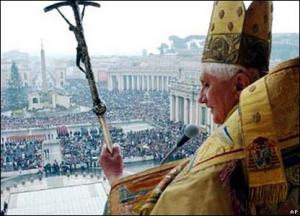Ten years have passed since that celebrated and feared turn of the century: the year 2000, which many thought would bring disaster, and many more hoped would herald in a new era of peace and communion in our troubled world. The intervening years have been years of suffering and uncertainty, but also of a growing realisation of the wonder of the cosmos, and the threat to the future of our beautiful blue planet. More and more voices are being heard – including our own – extolling the beauty, revelling in our interconnectedness with all of creation, and calling for an end to its wanton destruction. In his message for the World Day of Peace, (Jan 1), Pope Benedict once more adds his voice and the voice of the Church. Here we can only share some extracts:
“…It is imperative that mankind renew and strengthen “that covenant between human beings and the environment, which should mirror the creative love of God, from whom we come and towards whom we are journeying” …Can we remain indifferent before the problems associated with such realities as climate change, desertification, the deterioration and loss of productivity in vast agricultural areas, the pollution of rivers and aquifers, the loss of biodiversity, the increase of natural catastrophes and the deforestation of equatorial and tropical regions? Can we disregard the growing phenomenon of “environmental refugees”, people who are forced by the degradation of their natural habitat to forsake it – and often their possessions as well – in order to face the dangers and uncertainties of forced displacement? Can we remain impassive in the face of actual and potential conflicts involving access to natural resources? All these are issues with a profound impact on the exercise of human rights, such as the right to life, food, health and development.
Humanity needs a profound cultural renewal; it needs to rediscover those values which can serve as the solid basis for building a brighter future for all. Our present crises – be they economic, food-related, environmental or social – are ultimately also moral crises, and all of them are interrelated. They require us to rethink the path which we are travelling together. Specifically, they call for a lifestyle marked by sobriety and solidarity, with new rules and forms of engagement, one which focuses confidently and courageously on strategies that actually work, while decisively rejecting those that have failed. Only in this way can the current crisis become an opportunity for discernment and new strategic planning.
Economic activity needs to consider the fact that “every economic decision has a moral consequence”
A greater sense of intergenerational solidarity is urgently needed. Future generations cannot be saddled with the cost of our use of common environmental resources.
The ecological crisis shows the urgency of a solidarity which embraces time and space. It is important to acknowledge that among the causes of the present ecological crisis is the historical responsibility of the industrialized countries. Yet the less developed countries, and emerging countries in particular, are not exempt from their own responsibilities with regard to creation.
It is becoming more and more evident that the issue of environmental degradation challenges us to examine our life-style and the prevailing models of consumption and production, which are often unsustainable from a social, environmental and even economic point of view. We can no longer do without a real change of outlook which will result in new life-styles, “in which the quest for truth, beauty, goodness and communion with others for the sake of common growth are the factors which determine consumer choices, savings and investments”. Education for peace must increasingly begin with far-reaching decisions on the part of individuals, families, communities and states. We are all responsible for the protection and care of the environment. This responsibility knows no boundaries.
The Church has a responsibility towards creation, and she considers it her duty to exercise that responsibility in public life, in order to protect earth, water and air as gifts of God the Creator meant for everyone, and above all to save mankind from the danger of self-destruction.
If you want to cultivate peace, protect creation. The quest for peace by people of good will surely become easier if all acknowledge the indivisible relationship between God, human beings and the whole of creation. In the light of divine Revelation and in fidelity to the Church’s Tradition, Christians have their own contribution to make. They contemplate the cosmos and its marvels in light of the creative work of the Father and the redemptive work of Christ, who by his death and resurrection has reconciled with God “all things, whether on earth or in heaven” (
Col 1:20). Christ, crucified and risen, has bestowed his Spirit of holiness upon mankind, to guide the course of history in anticipation of that day when, with the glorious return of the Saviour, there will be “new heavens and a new earth”.
To access the whole message, copy and paste this link to your internet address bar: http://www.vatican.va
|

